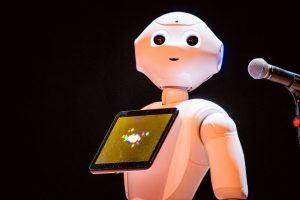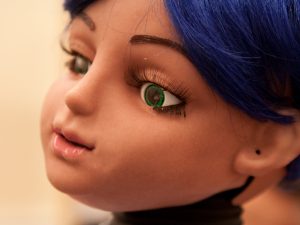‘Communicating with and Relating to Social Robots: Alice Meets Leolani’ – ALANI (406.D1.19.005)
NWO Open Competitie voor Digitalisering SGW 2019 (2020-2024)
Main applicant:
- Prof. Dr. Piek Vossen – Vrije Universiteit Amsterdam/Faculty of Humanities/Computational Lexicology & Terminology Lab (CLTL)
Co-applicants:
- Prof. dr. Elly Konijn – Vrije Universiteit Amsterdam/Faculty of Social Sciences
- Prof. dr. Johan Hoorn – The Hong Kong Polytechnic University and Vrije Universiteit Amsterdam – Faculty Faculties of Design/ Computer Sciences / Social Sciences
- To be hired: 2 PhD’s and 1 Postdoc and 1 Research Assistant
Budget: € 749,994,-


Social robots represent innovative laboratories for both the humanities and social sciences to study both natural language communication and processes and effects of social bonding with an ‘artificial other’. Social relationships between humans and social robots play a crucial role both for effective communication as well as for the willingness of people to engage into collaboration. In this project, we study how social communication and relationships between robots and humans develop as two sides of the same coin: bonding results in bett
communication and better communication results in better socio-affective bonding. Therefore, we propose a theoretical framework integrating both perspectives that guides the development of different robot scenarios that will be empirically tested in different user groups. We combine the Theory of Affective Bonding from a social sciences perspective with the Theory of Identity, Reference and Perspective (TIRP) from a linguistics perspective to optimally program social robots for communicative purposes. Likewise, a multi-method approach integrates qualitative and quantitative research designs, for short- and long-term studies both in the field and in the lab.
Furthermore, the research combines and extends the results of two previously developed systems for the robots Alice and Leolani, resulting in a merged novel system Alani.
Two PhDs will complementary test different scenarios, each from its own perspective, supported by the Postdoc’s work in developing a widely applicable and trustworthy test environment integrating the innovative theoretical and methodological frameworks. The result will be a landmark for future research on social and communicative robots with many societal applications.
So three interrelated theory-based empirical subprojects address three research questions , using qualitative methods for exploration and quantitative methods for testing hypotheses.
Subproject-1: Affective Bonding through Robot Communication (PhD1 will be refining the Theory of Affective Bonding in various robot communication scenarios).
Subproject-2: Robot Communication evoking Affective Bonding (PhD2 investigates through quantitative tests and refining the Theory of Identity, Reference and Perspective (TIRP) with robots across various scenarios, combining Big Data models with optimization of personalized data obtained through relation-based language models).
Subproject-3: Alice meets Leolani = Alani (Postdoc integrates both Alice’s emotion simulation and Leolani’s language AI and co-supervises the PhDs. Postdoc adjusts the AI-sorware to allow optimization and execution of the developed scenarios and pre-tests them with the robots. Postdoc further investigates human-system performance in terms of effort, efficiency, and effectiveness as well as user trust.
Public summary
To optimize human-robot communication, the pragmatic-semantic aspects of understanding natural language are connected to the mechanisms of social-affective bonding with robots. Put simply, what is needed from a robot conversationally for people to become friends with an artificial other? This results in blueprints for effective and personalized robot communication scenarios.

